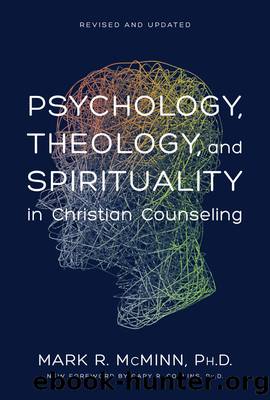Psychology, Theology, and Spirituality in Christian Counseling by McMinn Mark R.;

Author:McMinn, Mark R.;
Language: eng
Format: epub
Tags: RELIGION / Christian Life / Personal Growth, RELIGION / Christianity / Christian Life
ISBN: 5395744
Publisher: Tyndale House Publishers
Published: 1996-01-01T00:00:00+00:00
This is a difficult situation for a number of reasons, including ethical concerns about confidentiality, privacy, competence, and a counselorâs duty to protect others. Dr. Tenarrow went wrong when he forgot his first obligation to his client. When he learned about Mr. Fingersâs stealing, he became overwhelmed with his own emotions and responded out of his anger rather than considering the welfare of Mr. Fingers. A more reasoned response still might have involved confrontation but in a less threatening way. By threatening an already anxious man, Dr. Tenarrow introduced potential for harm. Reporting Mr. Fingers to his employer would have violated ethical standards and state law (in virtually all states) regarding confidentiality. To even hint at such a report is irresponsible and damaging.
Confronting sin, especially when done as direct censure, introduces power into the counseling relationship. At times this may be appropriate, but as the power differential increases, so must our sensitivity to the ethical implications of our words and actions.
A related ethical concern is that an awareness of sin can lead clients in one of two directions. For some, their natural response to understanding sin will be shame. For others, an awareness of sin leads them to an awareness of Godâs grace, as Paul describes in his epistle to the Romans. If Christian counselors help their clients confront sin, they have an ethical obligation to also point them toward grace as a resolution to sin.225 Those who are left to wallow in shame will be worse because of their awareness of sin. Those who experience grace will be enriched by their awareness of sin. This will be discussed in greater detail later.
Summary
Psychologists have generally been uninterested in sin, preferring to ignore it or to discuss the effects of the concept of sin. Because internal attributions heighten feelings of guilt and depression in many situations, mental health professionals have tended to avoid sin as an explanation for emotional problems, a practice based on a misunderstanding of the Christian notion of sin. To practice competent Christian counseling, we must understand sin from theological and spiritual perspectives. Properly understood, the original nature of sin allows Christians to give up unproductive and shame-producing efforts to manage personal sin by willpower alone. Instead, we need transforming encounters with Christ.
In Christian counseling, sin can be confronted in humble and empathic ways that encourage spiritual growth more than guilt and shame. These methods include silence at strategic moments, pondering aloud inconsistencies in clientsâ narratives, and questioning clients in order to understand their values of right and wrong. Understanding and changing the inner life of a client is more important than merely changing behavior. This calls Christian counselors to personal and spiritual disciplines that promote personal honesty, humility, and discernment.
Download
This site does not store any files on its server. We only index and link to content provided by other sites. Please contact the content providers to delete copyright contents if any and email us, we'll remove relevant links or contents immediately.
The 5 Love Languages: The Secret to Love That Lasts by Gary Chapman(9293)
The Space Between by Michelle L. Teichman(6581)
Assassin’s Fate by Robin Hobb(5862)
Wiseguy by Nicholas Pileggi(5324)
Everything Happens for a Reason by Kate Bowler(4480)
Gerald's Game by Stephen King(4382)
Pillow Thoughts by Courtney Peppernell(4026)
A Simplified Life by Emily Ley(3971)
The Power of Positive Thinking by Norman Vincent Peale(3865)
Resisting Happiness by Matthew Kelly(3197)
Girl, Wash Your Face by Rachel Hollis(3127)
Harry Potter and the Prisoner of Azkaban (Book 3) by J. K. Rowling(3117)
Being Aware of Being Aware by Rupert Spira(3087)
Real Sex by Lauren F. Winner(2869)
The Code Book by Simon Singh(2864)
More Language of Letting Go: 366 New Daily Meditations by Melody Beattie(2851)
Name Book, The: Over 10,000 Names--Their Meanings, Origins, and Spiritual Significance by Astoria Dorothy(2843)
The Holy Spirit by Billy Graham(2779)
The Secret Power of Speaking God's Word by Joyce Meyer(2755)
